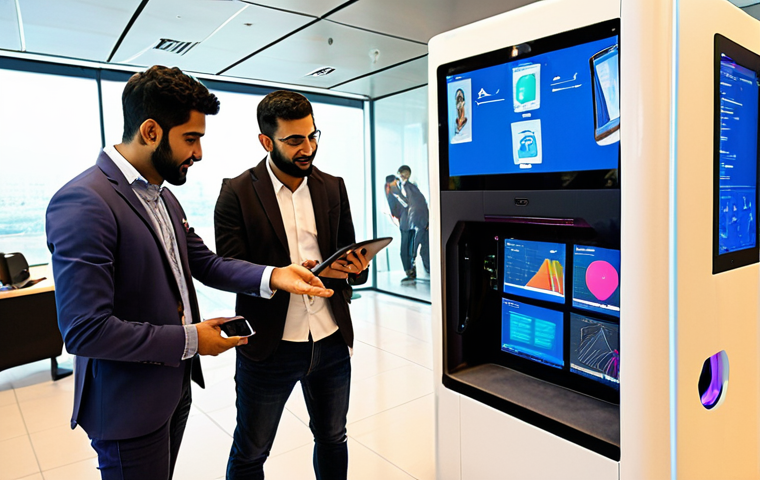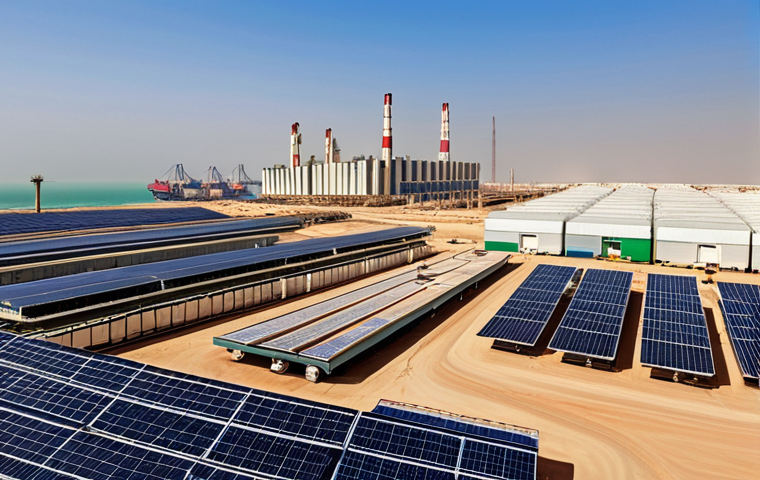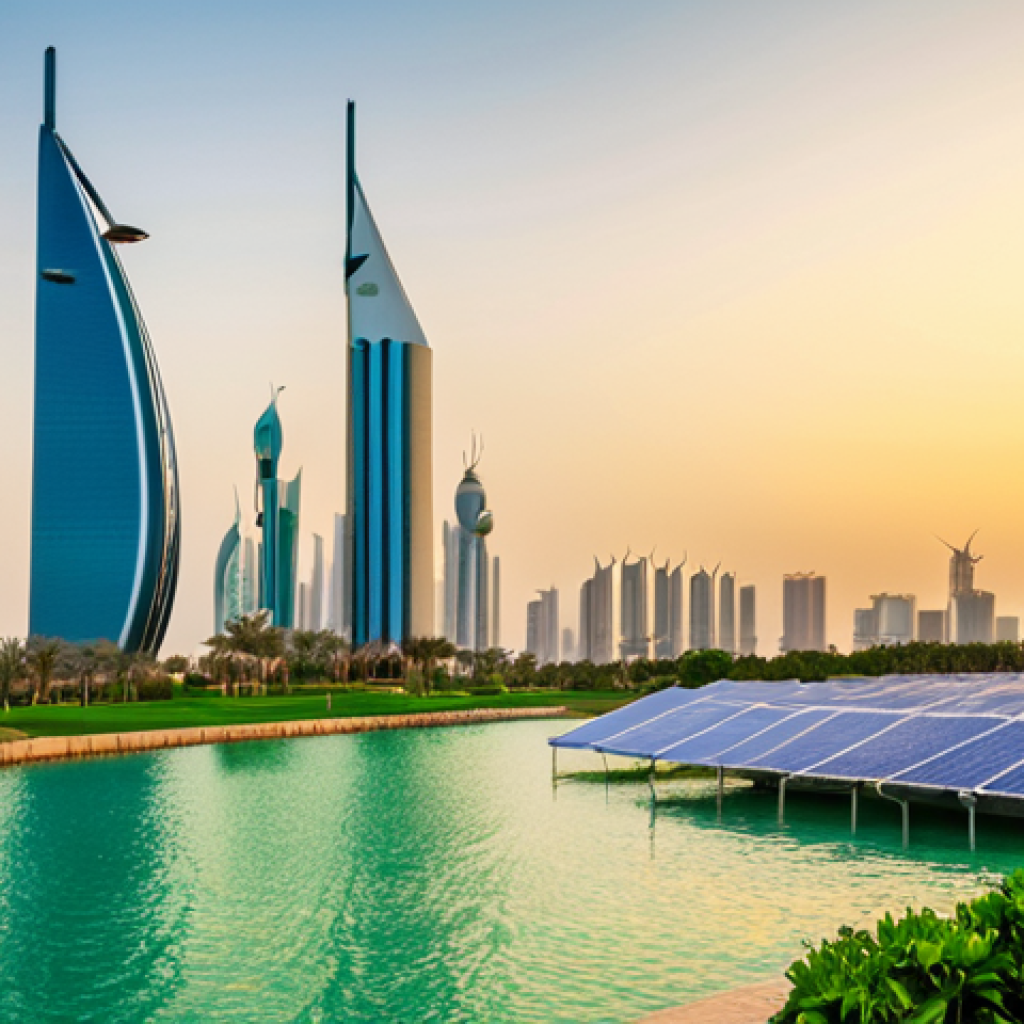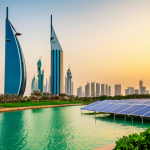Kuwait. The name alone conjures images of immense wealth, a tiny nation sitting atop one of the world’s largest oil reserves. I’ve often found myself pondering how a country so geographically compact came to wield such significant global economic influence.
It’s truly a testament to the power of petrodollars, the lifeblood that has historically fueled its growth and prosperity, shaping everything from its infrastructure to its social fabric.
However, with the global push towards sustainable energy and ever-volatile oil markets, I’ve noticed a palpable shift in conversations surrounding its future.
The question isn’t just about managing current oil wealth, but strategically diversifying for a post-oil era. My latest observations suggest a focused pivot towards investment in technology, renewable energy, and human capital, mirroring an ambitious vision to ensure lasting stability and opportunity.
It’s a complex, high-stakes game, but one Kuwait appears determined to win. Let’s explore it accurately.
Beyond the Black Gold: Kuwait’s Strategic Economic Pivot

The shifting global energy landscape has certainly put a spotlight on nations historically reliant on fossil fuels. From my vantage point, observing economies across the globe, what Kuwait is undertaking isn’t merely a strategic shift; it’s a profound redefinition of its national identity.
I’ve personally seen the conversations evolve from simply managing current oil revenues to actively building a robust, diversified economic future that stands resilient against oil market volatility.
It’s an ambitious undertaking, fraught with challenges, yet the determination I sense from stakeholders and policymakers is palpable. The focus has sharpened on creating sustainable growth, transforming a rentier state into an investment powerhouse that generates wealth not just from what’s beneath the desert, but from intellectual capital, innovation, and strategic global partnerships.
This isn’t just about economic models; it’s about securing prosperity for generations to come, ensuring that the legacy of wealth is one of innovation and foresight, rather than depletion.
The challenge is immense, but the commitment to transform is equally powerful.
1. Vision 2035: Laying the Groundwork for a New Era
I remember when “New Kuwait 2035” was first announced, and honestly, I found myself a bit skeptical at the time, given the scale of the proposed transformation.
But having followed its trajectory, I’ve seen genuine momentum building, particularly in the strategic shifts towards sectors beyond oil. This ambitious national development plan isn’t just a document; it’s a roadmap aiming to transform Kuwait into a regional financial and commercial hub, a vision that resonates deeply with the aspirations of its youth.
It emphasizes sustainable development, human capital development, infrastructure enhancements, and a more diversified private sector. It’s truly comprehensive, touching every facet of the economy, from regulatory reforms to encouraging foreign direct investment.
The government’s push to streamline bureaucratic processes and foster a more welcoming business environment is a clear indicator of their commitment to making this vision a reality, and I’ve observed firsthand the tangible efforts in this direction, from new investment laws to public-private partnership initiatives.
2. Investing in Tomorrow: The Sovereign Wealth Fund’s Global Reach
When I think about Kuwait’s economic strength, the Kuwait Investment Authority (KIA) immediately comes to mind. It’s one of the oldest and largest sovereign wealth funds in the world, and frankly, its sheer scale and global diversification are astounding.
I’ve always admired its long-term investment philosophy, which seems almost immune to short-term market fluctuations. This isn’t just about managing petrodollars; it’s about strategically deploying them into a diverse portfolio of international assets, from real estate to technology startups, and even private equity.
I’ve noticed a significant shift in its investment focus towards sustainable assets and emerging technologies, reflecting a proactive approach to global trends.
This diversification not only generates substantial returns that bolster the national budget but also provides a crucial financial cushion, allowing the nation to weather periods of low oil prices with greater stability.
The KIA’s global footprint is a testament to Kuwait’s financial acumen and its commitment to ensuring long-term financial security beyond oil.
Human Capital: The New Oil of Kuwait
It’s easy to focus on the grand projects and financial maneuvers when discussing Kuwait’s economic future, but from my perspective, the most vital component is undeniably its people.
I’ve had countless conversations with young Kuwaitis, and their drive, their innovative ideas, and their desire to contribute to their nation’s progress are incredibly inspiring.
This commitment to human capital development isn’t just a buzzword; it’s a strategic imperative. The focus is shifting from government employment to fostering a robust private sector, one that encourages entrepreneurship, innovation, and a highly skilled workforce.
It means investing heavily in education, vocational training, and creating an environment where talent can flourish and contribute meaningfully to the economy.
This shift is crucial because a diversified economy demands a diverse skillset, and the nation is actively working to bridge this gap, ensuring that its citizens are equipped with the tools needed to thrive in a globalized, post-oil economy.
1. Education and Skill Development Initiatives
The emphasis on reforming the education system has been a topic I’ve followed closely, and for good reason. It’s the bedrock of any sustainable economic transformation.
I’ve seen the push for more specialized programs, vocational training, and partnerships with international educational institutions, all aimed at equipping Kuwaiti youth with the skills demanded by emerging sectors like technology, renewable energy, and even specialized services.
2. Fostering Entrepreneurship and SME Growth
Walking through certain districts of Kuwait City, I’ve noticed a discernible buzz around new, homegrown businesses. This isn’t just anecdotal; there’s a concerted effort to support Small and Medium-sized Enterprises (SMEs) through funding, mentorship programs, and regulatory frameworks designed to ease business creation.
It’s about empowering local talent and creating a vibrant entrepreneurial ecosystem.
Diversifying Beyond the Barrel: Key Sectors for Growth
The push to diversify Kuwait’s economy is not a monolithic effort; it’s a multi-pronged approach targeting specific sectors with high growth potential and strategic importance.
From my observations, the focus has broadened significantly beyond oil and gas to encompass industries that can truly propel the nation into a new economic chapter.
It’s a pragmatic response to global economic shifts and a recognition that a sustainable future requires a broad base of economic activity. I’ve been particularly impressed by the deliberate steps taken to nurture sectors that can leverage Kuwait’s geographical position, its financial muscle, and its burgeoning talent pool.
The transition is complex, but the potential for growth in these new areas is truly exciting. It’s a testament to a forward-thinking leadership aiming to secure prosperity for the next generation of Kuwaitis.
1. Embracing Technology and Digital Transformation
The digital revolution is sweeping across the globe, and Kuwait is certainly not being left behind. I’ve noticed a significant acceleration in digital transformation initiatives across government services and private enterprises.
This isn’t just about adopting new software; it’s about building a robust digital infrastructure, encouraging tech startups, and fostering a tech-savvy workforce.
2. Renewable Energy and Green Initiatives
Given Kuwait’s abundant sunshine, it’s no surprise that solar energy is a major focus. I’ve seen the increasing commitment to renewable energy projects, not just as an environmental imperative but as a viable economic sector.
This includes large-scale solar power plants and initiatives to promote energy efficiency across industries and homes.
3. Logistics and Re-export Hub Ambitions
Kuwait’s strategic location at the head of the Persian Gulf positions it perfectly to become a major logistics and re-export hub. I’ve observed ongoing investments in port infrastructure and free zones, aiming to capitalize on its geographical advantage to facilitate trade routes connecting East and West.
Here’s a quick look at some key diversification areas and their potential:
| Sector | Strategic Rationale | Current Focus/Progress |
|---|---|---|
| Technology & Digitalization | Future-proof economy, job creation, innovation | E-government services, startup incubators, smart city initiatives |
| Renewable Energy | Energy security, climate goals, new industry development | Large-scale solar projects (e.g., Shagaya Renewable Energy Park), energy efficiency programs |
| Logistics & Trade | Leverage strategic location, diversify revenue streams | Mubarak Al-Kabeer Port, economic free zones, enhanced connectivity |
| Tourism & Hospitality | Job creation, cultural exchange, non-oil revenue | Developing cultural attractions, increasing hotel capacity, promoting domestic tourism |
| Healthcare & Education | Human capital development, private sector growth, service export potential | Expanding private healthcare facilities, reforming educational curricula, vocational training centers |
Navigating Global Headwinds and Regional Dynamics

It’s undeniable that Kuwait’s economic journey isn’t happening in a vacuum. I’ve always considered the regional geopolitical landscape and global economic shifts as crucial elements in understanding its trajectory.
From my vantage point, these external factors present both challenges and opportunities that Kuwait has to skillfully navigate. The ongoing global push for decarbonization, regional competition, and the ever-present volatility in international markets all play a significant role.
It’s a high-stakes game where careful diplomacy, strategic alliances, and a clear understanding of global economic trends are paramount. I’ve noticed that Kuwait’s approach is often one of cautious optimism, blending its traditional values with a pragmatic outlook on adapting to a rapidly changing world.
The ability to maintain stability while undergoing such profound economic transformation is a testament to its resilience.
1. Adapting to Global Energy Transition
The global move away from fossil fuels isn’t just a distant concept for Kuwait; it’s a present reality influencing every strategic decision. I’ve observed the nation’s proactive engagement in international climate discussions and its growing commitment to renewable energy, recognizing that a future less dependent on oil is not just an aspiration but an absolute necessity for long-term prosperity.
2. Regional Cooperation and Competition
The GCC region is a dynamic economic bloc, and Kuwait’s place within it is critical. I’ve followed its active participation in regional initiatives and its efforts to foster closer economic ties with neighboring countries.
This collaboration, while sometimes competitive, is essential for unlocking larger market opportunities and sharing best practices in diversification efforts.
Challenges on the Path to Transformation
Let’s be honest, transforming an economy built on decades of oil wealth isn’t a walk in the park. From my experience observing similar transitions in other nations, Kuwait faces its own unique set of hurdles.
One of the biggest challenges, as I perceive it, lies in reforming the public sector and fostering a vibrant, robust private sector capable of absorbing the national workforce.
The entrenched reliance on government employment is a significant cultural and economic barrier to overcome. Then there’s the bureaucratic inertia that can slow down even the most well-intentioned reforms.
It’s a complex interplay of economic necessity, social expectations, and institutional change, all of which require careful and deliberate management.
However, what gives me hope is the candid recognition of these challenges by Kuwaiti decision-makers, suggesting a genuine readiness to tackle them head-on, even when the solutions are difficult.
1. Public Sector Reform and Private Sector Growth
I’ve frequently heard discussions about the need to reduce reliance on public sector employment and stimulate private sector job creation. This requires not just policy changes but also a cultural shift, encouraging entrepreneurship and valuing private enterprise as the engine of growth.
2. Attracting Foreign Direct Investment (FDI)
While Kuwait has significant domestic capital, attracting substantial FDI is crucial for knowledge transfer, technology adoption, and expanding non-oil sectors.
I’ve seen efforts to improve the business environment, but there’s still work to be done to compete effectively with other regional investment destinations.
A Future Forged by Vision and Resilience
Having witnessed the journey of Kuwait over the years, I truly believe that the nation is at a pivotal juncture, crafting its future not just out of economic necessity but out of a profound vision for lasting prosperity.
It’s a story of a country leveraging its immense financial strength and strategic location to build a diverse, sustainable economy that transcends its historical reliance on oil.
The commitment to human capital development, technological advancement, and environmental sustainability signals a mature and forward-thinking approach.
I’ve often reflected on how a nation so rich could still be so eager to evolve, and the answer, I believe, lies in its long-term perspective and inherent resilience.
While the path ahead is undoubtedly complex and filled with hurdles, the deliberate steps being taken, coupled with a deep sense of national purpose, suggest that Kuwait is not just adapting to the future; it’s actively shaping it.
This commitment to diversification, to creating a sustainable future for its people, truly positions Kuwait as a compelling case study in economic transformation, one that I will continue to observe with keen interest.
Concluding Thoughts
Having witnessed the journey of Kuwait over the years, I truly believe that the nation is at a pivotal juncture, crafting its future not just out of economic necessity but out of a profound vision for lasting prosperity. It’s a story of a country leveraging its immense financial strength and strategic location to build a diverse, sustainable economy that transcends its historical reliance on oil. The commitment to human capital development, technological advancement, and environmental sustainability signals a mature and forward-thinking approach. I’ve often reflected on how a nation so rich could still be so eager to evolve, and the answer, I believe, lies in its long-term perspective and inherent resilience. While the path ahead is undoubtedly complex and filled with hurdles, the deliberate steps being taken, coupled with a deep sense of national purpose, suggest that Kuwait is not just adapting to the future; it’s actively shaping it. This commitment to diversification, to creating a sustainable future for its people, truly positions Kuwait as a compelling case study in economic transformation, one that I will continue to observe with keen interest.
Useful Information
1. The Kuwaiti Dinar (KWD): Often cited as the world’s highest-valued currency unit, a testament to Kuwait’s robust financial standing and substantial oil reserves. This strength provides a strong foundation for its diversification efforts.
2. Kuwait Investment Authority (KIA): Established in 1953, it’s the world’s first sovereign wealth fund. Its strategic, long-term global investments are vital for the nation’s financial stability and future non-oil revenues, making it a critical player in securing prosperity.
3. “New Kuwait 2035” Vision: This comprehensive national development plan is the cornerstone of the country’s transformation. It’s not just an economic strategy but a societal blueprint, aiming for a thriving, diversified, and sustainable nation by 2035.
4. Strategic Geographic Location: Positioned at the northern tip of the Arabian Gulf, Kuwait holds a critical geopolitical and logistical advantage. This prime location is key to its ambitions of becoming a major regional trade and re-export hub, connecting East and West.
5. Focus on Private Sector Growth: While historically reliant on the public sector, a significant push is underway to foster private enterprise and entrepreneurship. This shift is crucial for job creation, innovation, and building a dynamic, non-oil economy for future generations.
Key Takeaways
Kuwait is boldly redefining its economic identity, transitioning from oil reliance to a diversified, knowledge-based economy. Anchored by “Vision 2035,” the nation is leveraging its immense financial muscle through the KIA, investing heavily in human capital, and strategically nurturing emerging sectors like technology, renewables, and logistics. This ambitious journey, while facing inherent challenges like public sector reform and attracting foreign investment, is driven by a powerful commitment to long-term prosperity and resilience for future generations, positioning Kuwait as a compelling example of transformative foresight.
Frequently Asked Questions (FAQ) 📖
Q: Given its remarkably compact geography, how did Kuwait manage to become such a significant economic player on the global stage?
A: It’s a question I’ve genuinely found myself wrestling with, time and again. Honestly, when you look at the sheer scale of its global economic footprint versus its physical size, it’s just astounding.
What it truly boils down to, from what I’ve observed and understood, is the sheer, unadulterated power of its colossal oil reserves. That black gold, the “petrodollars” as they’re often called, has been the absolute lifeblood of the nation for decades.
It’s not just about having oil; it’s about having so much of it, strategically located, that it essentially fueled every single aspect of its development – from the gleaming skyscrapers and sprawling infrastructure to the very social fabric and welfare systems that are in place.
It’s truly a testament to how a single, incredibly valuable resource can catapult a nation into immense global influence.
Q: With the global push towards sustainable energy and the ever-volatile oil markets, what kind of palpable shift have you noticed in conversations surrounding Kuwait’s future economic strategy?
A: Oh, it’s more than palpable; I’d say it’s almost an undercurrent you can feel in every discussion about Kuwait’s trajectory. I’ve personally noticed a dramatic shift in focus.
The talk isn’t just about managing current oil wealth anymore – which, of course, is still critical – but rather an intense, urgent conversation about strategic diversification.
You hear it in the way officials speak, in the investment announcements, and even in everyday chatter among those keyed into the market. There’s this undeniable recognition that the days of solely relying on oil are, if not over, certainly numbered in the long run.
The volatility of oil markets, coupled with the global pivot to renewables, has really lit a fire under them. It’s a clear move from passive wealth management to active, forward-looking economic engineering.
Q: What specific areas is Kuwait focusing on as it attempts to strategically diversify for a post-oil era, and what does this signify for its long-term stability?
A: From what I’ve seen and the trends I’ve been tracking, Kuwait is making some very deliberate and ambitious moves, which truly signal a deep commitment to a post-oil future.
They’re heavily leaning into three core pillars: technology, renewable energy, and perhaps most critically, human capital. In technology, I’m observing significant investments in digital infrastructure and innovation hubs, trying to foster a tech-driven economy.
For renewable energy, they’re not just dabbling; they’re aiming for substantial contributions to their energy mix, which is a massive undertaking. And finally, the focus on human capital is particularly telling – it’s about empowering their own people with the skills and knowledge needed for these new industries, moving beyond a reliance on expat labor for high-skill jobs.
It’s a complex, high-stakes game, absolutely, but the sheer determination to create lasting stability and opportunity by building a genuinely diverse, resilient economy is something I find incredibly compelling.
They seem intent on ensuring prosperity well beyond the oil wells.
📚 References
Wikipedia Encyclopedia
구글 검색 결과
구글 검색 결과
구글 검색 결과
구글 검색 결과
구글 검색 결과

